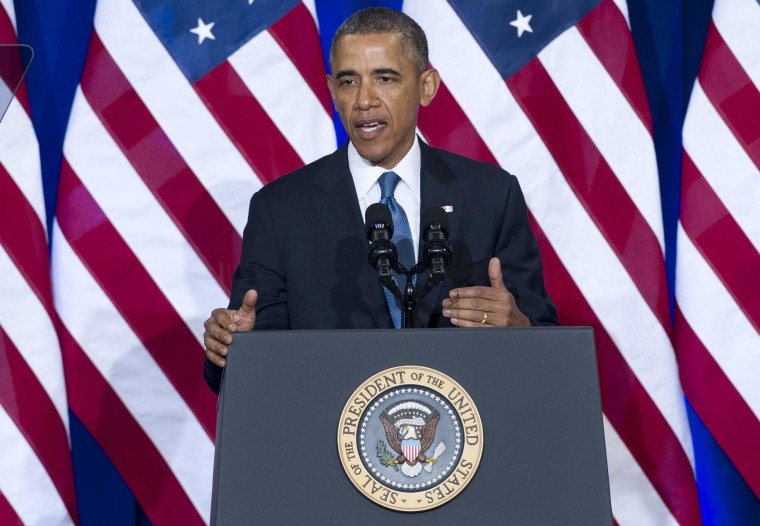President Barack Obama's proposed NSA reforms won at least grudging praise from proponents and opponents of the nation’s broad surveillance program after his speech on Friday.
Obama and the data-gathering program have endured criticism from a handful of libertarian-minded conservatives on Capitol Hill. Yet the president's speech -- at first glance -- appeared to strike a balance between civil liberties-minded and national security-oriented lawmakers alike. His proposals included changing the way massive amounts of telephone data is stored as well as increased judicial oversight over how that information is accessed by the government.
The speech won a thumbs up from top Democrats who have been particularly critical of the NSA’s past practices.
In a joint statement, Democratic Sens. Ron Wyden of Oregon, Mark Udall of Colorado and Martin Heinrich of New Mexico called the president’s directive to end bulk collection of phone records “a major milestone” and “vindication” for privacy rights activists.
“Ending this dragnet collection will go a long way toward restoring Americans’ constitutional rights and rebuilding the public’s trust," a trio of Democrats said.
“After the long push to rein in overbroad surveillance powers, we are very pleased that the President announced his intent to end the bulk collection of Americans’ phone records,” the trio said. “Ending this dragnet collection will go a long way toward restoring Americans’ constitutional rights and rebuilding the public’s trust.”
The group added that they will keep pushing for additional reforms, like reforms to the Foreign Intelligence Surveillance court process and protections for American IT companies.
In a joint statement, the Democratic and Republican chairs of Senate and House intelligence panels lauded Obama for a "strong" speech. And they urged Obama to send legislation to Congress mapping out the changes to storage of meta-data.
"If instituted, that approval process must be made faster in the future than it was in the past-when it took up to nine days to gain Court approval for a single search," Sen. Dianne Feinstein, D-Calif., and Rep. Mike Rogers, R-Mich., said in a joint statement. "We encourage the White House to send legislation with the president's proposed changes to Congress so they can be fully debated."
Democratic Sen. Patrick Leahy, the powerful chief of the Senate Judiciary Committee, called for similar legislative reforms but praised the president’s rejection of the existing surveillance program.
“I am encouraged that the president has embraced the growing consensus that the [NSA] phone records program should not continue in its current form. The bulk collection of Americans’ phone records has not made us safer,” he said.
California Democrat Adam Schiff, a member of the House Intelligence Committee who has sponsored legislation to reform the NSA, said the burden is now on Congress to implement reforms to maintain citizens’ privacy.
“Though the steps announced today are important, it will be up to Congress to implement many of these changes, as well as others, and to ensure that they are durable across future Administrations,” he said.
And Republicans also largely gave Obama a pass for his proposed reforms.
Rep. Peter King, R-N.Y., a strong supporter of the surveillance programs, wrote on Twitter: "Pres Obama NSA speech better than expected. Most programs left intact. But concerned about extending US citizen privacy rights to foreigners"
"I look forward to learning more about how the new procedure for accessing data will not put Americans at greater risk," John Boehner said.
Arizona Republican Sen. John McCain voiced concerns that Obama's speech "left many crucial questions unanswered," and called for establishing a Senate select committee to parse through national security and intelligence issues. But he largely spared Obama from any specific critique.
Republican leaders in both chambers of Congress -- Speaker John Boehner and Senate Minority Leader Mitch McConnell -- were largely muted in the speech's aftermath. Boehner said Obama had "failed" to adequately make the case for monitoring programs, but said he would wait to see details of the proposal.
"I look forward to learning more about how the new procedure for accessing data will not put Americans at greater risk," the speaker said in a statement. "And the House will review any legislative reforms proposed by the administration, but we will not erode the operational integrity of critical programs that have helped keep America safe."
Criticism from Republicans came from familiar voices -- libertarian-minded conservatives who have been consistently-critical of Obama and the national security apparatus.
"President Obama's announced solution to the NSA spying controversy is the same unconstitutional program with a new configuration," Kentucky Republican Sen. Rand Paul said in a statement.
"Nothing the President said today will end the unconstitutional invasion of Americans' privacy," said Michigan Rep. Justin Amash, a Republican acolyte of Paul's libertarianism.
